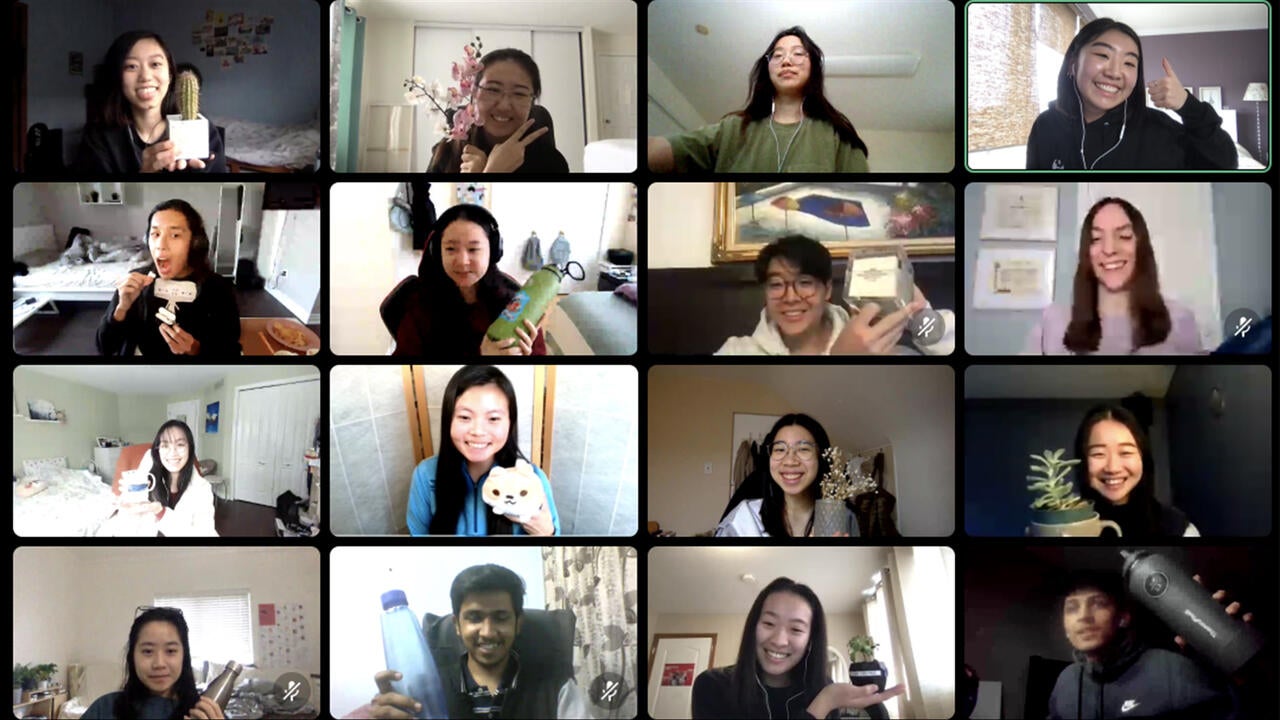
Hack the North 2021
Tapping into tech and gaining valuable skills along the way

Tapping into tech and gaining valuable skills along the way
By Jon Parsons Faculty of MathematicsMost students develop an interest in technology and programming long before they begin their post-secondary education.
The path to becoming a developer, analyst or software engineer does not usually start in a computer science course at university, but in the opportunities available to students outside the classroom.
Hack the North is just this kind of event that allows students to gain valuable skills, learn about the tech industry’s culture and network with like-minded peers who share their interests.
“Hack the North exists to give anyone the ability and the opportunity to dream big,” said Jessica Zhang, one of the co-directors of the event. “Whether that’s through workshops or mentorship, whether that’s through the speaker panels or networking, we’re connecting people and giving them a space and the resources to build something amazing.”
Bringing together more than 3,000 students from Canada and around the globe, Hack the North is a unique student-led hackathon. In its eighth year, the event operates in partnership with the Faculty of Mathematics and the Faculty of Engineering at the University of Waterloo. The two faculties provide ongoing logistical support and funding.
Hack the North is sponsored by some of the biggest and most innovative global and local tech brands, including Hootsuite, Facebook, Google, Cisco, D2L and Ubisoft.
Emily Wang, the other co-director, said the partnerships and sponsorships are instrumental in the success of Hack the North. Some sponsors also provide access to exciting application programming interfaces (APIs), which participants can use to create apps.
“Hackers are free to use whatever technology or platform they want during the event, so we don’t have any limitations or restrictions in that way,” Wang said. “But we do have certain sponsors that have their own APIs that hackers can use, and there are special API prizes as well.”
Even as many participants in Hack the North will enter the event with significant background and experience in tech and programming, there are also many beginners. The hackathon caters to all skill levels. This year, Hack the North features a “Gear Up week,” which runs five days before the main event kicks off and is open to the public.
As Wang explains, Gear Up has some “30 plus workshops to help participants gain new skills and be ready to build their project in the hackathon, instead of learning everything during the weekend of the event.”
Along with its egalitarianism and welcoming of new and experienced hackers alike, Hack the North is organized by students, for students. Zhang is currently enrolled in the computer engineering program at the University of Waterloo. Wang is likewise an undergraduate student in Waterloo’s system design engineering program. Students make up all the volunteers and various organizing committees.
As a student-led and student-organized event, Hack the North has a distinctive character among hackathons. The mandate for the annual event extends beyond learning tech skills to focus on equity, diversity and inclusion in the tech industry writ large. Organizers put the event together so that participants get to meet and work with students from different backgrounds and with different experiences. And throughout the event’s 36 hours, there are numerous side activities and breakout groups so students can meet one another and simply make new connections.
“We have the ability to set the tone and to show hacking can be a way to help underrepresented groups find their place in tech and continue along that path,” said Zhang. “Hack the North is one of the bigger and more established hackathons in the North American hackathon sphere, which means we can be role models for other hackathons. Diversity, equity and inclusion are really important to our organizing team and the whole event. This year we’re focusing on this aspect even more and trying to make strides in that area.”
Every year, Hack the North features special guests and speakers, which have included tech industry leaders, CEOs, and luminaries. Some of these same special guests may also act as judges for the various apps and programs the students create in the hackathon or join student groups as mentors.
This year’s speakers and special guests are something of a guarded secret, so anyone interested should look for ways to get involved. Hack the North 2021 runs from Friday, September 17, to Sunday, September 19. Visit the Hack the North website for more information.

Read more
Redefining capstone learning by bringing students, faculty and community partners together to tackle real-world challenges

Read more
Here are the people and events behind some of this year’s most compelling Waterloo stories

Read more
A winter holiday message from President Vivek Goel
The University of Waterloo acknowledges that much of our work takes place on the traditional territory of the Neutral, Anishinaabeg, and Haudenosaunee peoples. Our main campus is situated on the Haldimand Tract, the land granted to the Six Nations that includes six miles on each side of the Grand River. Our active work toward reconciliation takes place across our campuses through research, learning, teaching, and community building, and is co-ordinated within the Office of Indigenous Relations.